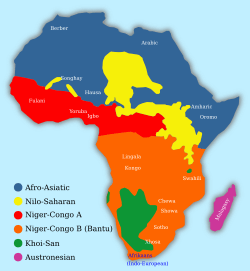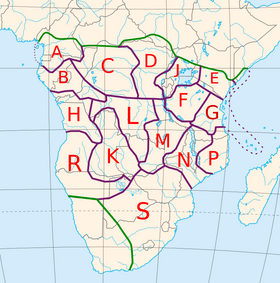Bantu languages facts for kids
Quick facts for kids Bantu |
|
|---|---|
| Geographic distribution: |
Subsaharan Africa, mostly Southern Hemisphere |
| Linguistic classification: | Niger–Congo
|
| Subdivisions: |
Northeast Bantu
Zones A–S (geographic)
Central Bantu (in doubt)
Northwest Bantu (in doubt)
|
| ISO 639-2 and 639-5: | bnt |
| [[File:
Map showing the approximate distribution of Bantu vs. other Niger-Congo languages.|300px]] |
|
The Bantu languages (or Narrow Bantu languages) are a branch of the Niger-Congo languages. There are about 520 languages in the Bantu family, 670 languages in the Southern Bantoid branch which includes Bantu, and 1,532 in Niger-Congo. Bantu languages are spoken largely east and south of the present day country of Cameroon; i.e., in the regions commonly known as central Africa, east Africa, and southern Africa. Parts of the Bantu area include languages from other language families (see map). The Bantu language with the largest total number of speakers is Swahili.
The Bantu language with the largest number of native speakers is Shona with 13.8 million speakers in Zimbabwe, Mozambique, Botswana and Zambia. Zulu comes second with 10.3 million speakers.
The Bantu languages came from the region of eastern Nigeria or Cameroon. About 2000 years ago the Bantu people spread southwards and eastwards, introducing agriculture and iron working and colonizing much of the continent.
Bantu words popularised in western cultures
Some words from various Bantu languages have been borrowed into western languages. These include:
- Maho, Jouni F. 2001. The Bantu area: (towards clearing up) a mess. Africa & Asia, 1:40–49 .
- Maho, Jouni F. 2002. Bantu lineup: comparative overview of three Bantu classifications . Göteborg University: Department of Oriental and African Languages.
- Piron, Pascale. 1995. Identification lexicostatistique des groupes Bantoïdes stables. Journal of West African Languages, 25(2): 3–39.
-
- Contini-Morava, Ellen. Noun Classification in Swahili. 1994.
See also
 In Spanish: Lenguas bantúes para niños
In Spanish: Lenguas bantúes para niños



